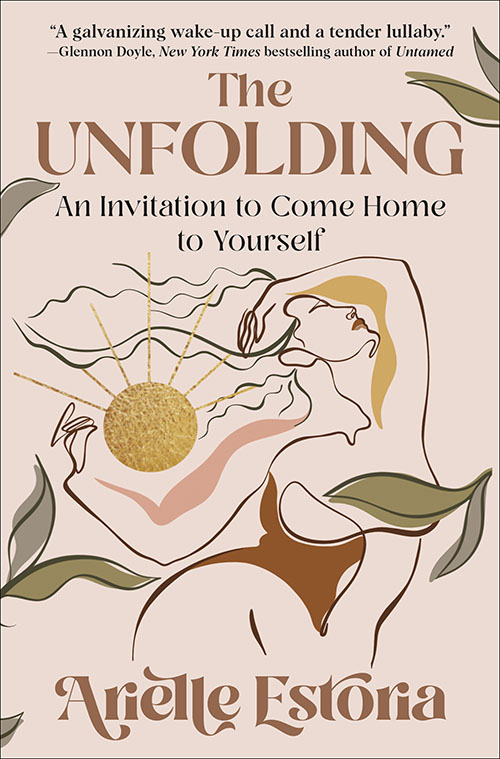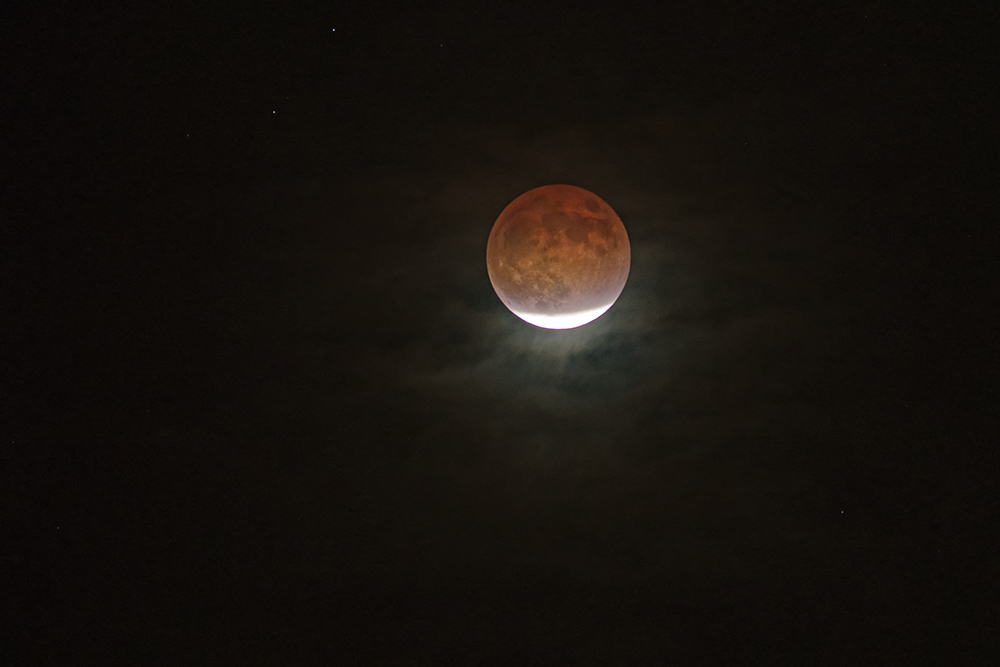
Arielle Estoria, author of The Unfolding: An Invitation to Come Home to Yourself (Courtesy of Arielle Estoria)

Arielle Estoria is a multi-hyphenate creative known for her expressive performance style as a spoken-word poet, her vulnerable yet bold writing and her talent for uplifting others and exuding joy. While she identifies as a Christian, Estoria has a knack for communicating age-old spiritual truths in new and refreshing ways that are accessible to a wide audience of many traditions — truly catholic, as in "universal."
After reading her book The Unfolding: An Invitation to Come Home to Yourself, I had the chance to meet with Estoria to chat about it. Through reflections, poetry and meditations, Estoria unpacks how her sense of self and relationship to her Christian religious practices and beliefs evolved with her life's stages.
She describes her experience as a Black woman and an influencer in the wake of the tumult and struggle for justice after the murders of George Floyd, Breonna Taylor and Ahmaud Arbery in the same year. As she navigated feelings of brokenness and waded through grief, she learned to distinguish God's voice deep within her heart from the many other voices around her.
While her own story is deeply inspiring, the book is not only meant to be biographical but to serve as a guide for each reader's own Unfolding process.
Advertisement
Estoria is not Catholic, but her wisdom reminded me of the spirituality of St. Ignatius of Loyola, the playful and practical tone of St. Thérèse of Lisieux (whose feast day also happens to be the author's birthday) and the stages of St. John of the Cross' "Dark Night of the Soul" — despite the fact that Estoria had been unfamiliar with these works when I asked her about them.
It's fascinating to see the way the Spirit inspires people from many walks of life and allows them to encounter similar truths.
Estoria breaks the process of Unfolding down into five parts: "The Awakening," "The Eclipsing," "The Mending," "The Illuminating" and "The Returning."
The Awakening
The Awakening is the point when you realize something in your life must change — or that something is already changing — in order for you to enter your "next phase of becoming."
Estoria's name, Arielle, means "lioness," and the author describes how during her Awakening phase, she began to listen to a soft purr within that grew into a powerful roar. This phase confronts you with the question: "Am I going to stay the same or am I going to lean into the change that's beckoning me?"

(Unsplash/Birger Strahl)
Having grown up as the daughter of a Baptist pastor with "a fear-driven concept of God," Estoria had never let herself question her faith and wanted to believe in the uncompromising certainty of everything. She describes her eventual experience of being "beckoned toward the more."
For Estoria, her "more" was choosing the man she wanted to marry, as well as growing into a new version of herself that was reconciling and wrestling with all she had always held to be true.
Similarly, St. Ignatius of Loyola also heard this beckoning toward what he referred to as the magis (Latin for "more"). In his journey toward following the magis, St. Ignatius identified two general spiritual movements that he experienced: consolation (a sense of God's nearness or being directed toward God) and desolation (a sense of God's absence or abandonment, or a movement away from God).
Arielle, without using this language, illustrates her own experiences of consolation and desolation in The Awakening through poems like "Arise":
I thought I was crazy ...
that I could not trust the voice inside of me, whispering,
beckoning me into the uncharted unknown ...
this was not a breaking
though there was a bending occurring ...
I found the Divine in the brokenness ...
this voice, no longer buried inside
led me here to this love.
The Eclipsing
Like the earth passes between the sun and moon and its shadow causes a lunar eclipse, Estoria describes her experience of The Eclipsing as her present self crossing her future self. It was a hard season of restlessness, darkness and searching for answers from friends, family and voices outside herself; seeking approval, while also seeking answers from God and longing for peace.

(Wikimedia Commons/Ryo FUKAsawa)
This phase, along with aspects of The Awakening, reminded me of what St. John of the Cross calls the "purgative way" of spiritual union with God, where all that is false self, ego, sin, whatever gets in the way of God or seeks to take God's place, is purged from the soul. Often this happens through tribulation and can consist of great suffering and even a sense of loneliness.
In her poem "Becoming" Estoria writes: "though painful at times, do not be afraid to sit in the beautiful tension that growth is birthed out of."
The Mending
The Mending is a season of reassembling our broken pieces, and Estoria opens this chapter with the image of kintsugi, the Japanese art of repairing broken pottery with gold, silver or platinum lacquer, bringing new and even greater beauty to the original piece as a result of its former brokenness.
She illustrates a pivotal moment of her own Mending through a "God Moment." While on a pilgrimage, she feels an urge to go down to the sea by the place where she was staying. She follows a path to a lighthouse and looks out at the water, "Salt meshing with salt, becoming one body, mind, spirit, being, with whatever holiness resided in the ocean / 'Here? In all places this is my God moment?' / 'Exactly,' I heard back, soft and sure."
Arielle Estoria guides the reader to move beyond the either/or to the both/and, embracing the tension and healing in between.
Ignatian spirituality recognizes God in all things, and in this moment Estoria encounters God through the ocean, much like Elijah in the gentle whispering wind or Moses through the burning bush. In the Mending, Estoria guides the reader to move beyond the either/or to the both/and, embracing the tension and healing in between.
The Illuminating
The Illuminating (similarly titled to St. John of the Cross's second state, the "illuminative way") is described as "the phase when you let light into your newly mended self. It includes the aha moments." You are not overpowered by the voices of others and their opinions of you, there is greater freedom to listen to that inner guiding voice.
Likewise, in St. John's "illuminative way," the soul is no longer tempted by "mortal sin" or things of the false self that disconnect from God and one's inner self, and the soul experiences abundant freedom and joy.

(Unsplash/Annie Spratt)
The joy of the soul is illustrated beautifully in Estoria's poem "Wildflowers":
... the wildflowers often mistaken for weeds
their beauty skipped over, unseen
and yet they still keep growing
with no permission needed
because they have come to terms with the reality
that they were not made for anyone else's approval ...
they grow where they want to ...
they dance because they want to
wild with no apologies."
In reading her poem, I was reminded of the wisdom of St. Thérèse of Lisieux, who reflected on wildflowers in her own autobiography, The Story of a Soul: "I understood that if all flowers wanted to be roses, nature would lose her springtime beauty, and the fields would no longer be decked out with little wild flowers."
Both women recognize the freedom and the beauty in the wildflowers. There is no comparison or seeking outside approval. They simply bloom and grow and reflect the light they take in, illuminating the fields.
So do we, like the flowers, bloom and illuminate as we move through this phase of unfolding and becoming.
The Returning
Fittingly, Estoria titles the final stage The Returning. She calls it this because in this process of unfolding and shedding layers, more of who you have always been, your truest self, God-in-you is revealed.
This bears some resemblance to St. John's third state, "the unitive way," in which the soul is so consumed with love that God and one's soul are in a state of perfect union.
Estoria describes The Returning as learning to "trust [her]self again" saying,
I was returning to my voice ... knowing what it meant to embrace fullness and freedom in my body. ... If we as Christians claim to be so free in Christ, then why do we still have all these chains? So yeah, you can find me dancing like David ... in my underwear, sipping wine. Selah. The Returning means I can encounter God again in a way that isn't clouded.
Estoria's descriptions of what Returning looks like might subvert some traditional Christian notions of what holiness ought to look like. And yet, the fruit is the same as what the saints describe as the fruits of spiritual union: interior freedom, joy and peace.
Many Christians may resist a dark night of the soul or an Unfolding journey, and continue to listen to outside voices, fearing the mystery that is God. Those who have the courage to follow will be led where they may not want to go, yet it is in letting go that they can find greater freedom in God.
Estoria states, "The Returning brings us back to the goodness that was always meant for us ... a return to the garden of freedom, of intimacy with our Creator."
For Estoria, this manifests in recognizing that her Black identity is not separate from her spirit and letting go of a white-washed Jesus; in letting go of internalized body shame; in uplifting and embracing her LGBTQ+ loved ones; in standing alongside her fellow BIPOC community members in the fight for racial justice.
In our conversation, I asked Estoria more about how we lean into change, and she reflected,
You are cellularly a different person. We're cellularly different people than when we first sat down to talk. That in itself should give more space and more room for all the other ways that we change and grow and evolve. There's a difference between changing and fitting within molds or boxes for a certain response from other people for accepting or belonging, versus a change that's expanding. I think there is a core to who we are that really doesn't shift. But it's those outside layers that continue to shed and fall and change as life goes on.









